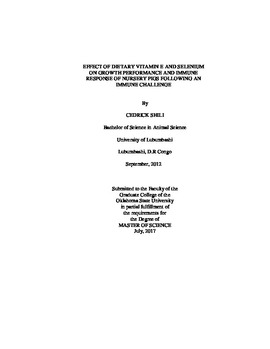| dc.contributor.advisor | Carter, Scott D. | |
| dc.contributor.author | Shili, Cedrick Ndhumba | |
| dc.date.accessioned | 2018-06-25T16:31:27Z | |
| dc.date.available | 2018-06-25T16:31:27Z | |
| dc.date.issued | 2017-07-01 | |
| dc.identifier.uri | https://hdl.handle.net/11244/300315 | |
| dc.description.abstract | Abstract: An experiment was conducted to evaluate the effects of selenium and vitamin E on growth performance and immune response of nursery pigs. To study the acute immune response, pigs were subjected to an acute immune challenge by a single intraperitoneal injection of lipopolysaccharide (LPS). Two hundred eighty mixed sex piglets (PIC 380) breed with an initial BW of 5.8 kg were used in a 36 d experiment. Pigs were housed 10 pigs/pen (5 gilts and 5 barrows), piglets were blocked and stratified based on sex and BW. Pigs and feeders were weighed once per WK to determine ADG, ADFI and G:F ratio. Serum samples were used to analyze tumor necrosis factor TNF-? and interleukin IL-1 concentrations using ELISA Kit, and plasma samples were used to determine the enzyme Glutathione peroxidase activity. On d 21 of the study, 4 pigs from each pen were challenged with LPS E.coli O111:B4 suspended in a 9 g/L of sterile saline solution for a final dosage of 25 µg of LPS/kg of BW. Between d 8 and 21, the results indicate that vitamin E and selenium did not improve ADG, ADFI, and G:F . Between d 21 and 36, pigs supplemented with selenium and both Se. 0.3 and vitamin E 32 IU improved ADG and G:F efficiency. Overall, G:F was improved (P=0.04) in pigs fed 0.3 mg/kg of selenium and vitamin 32 IU compared to pigs fed 0.15 mg/kg and vitamin E 16 IU/kg. This improvement might be attributed to selenium utilization during protein turnover for the synthesis of sulfur-containing amino acids. Following LPS challenge, there was an increase production of proinflammatory cytokines such as TNF-? and IL-1?. A numeric decrease of TNF-? and IL-1? was observed in pigs fed additional Se and vitamin E. However, no statistical difference was observed among the dietary treatments.The benefits of decreasing production of cytokines in pigs fed additional Se and vitamin E following LPS challenge strengthens the concept that antioxidants can enhance and prevent depressions in performance under periods of stress. More study in this area is needed to better understand the required amount of vitamin E to improve the immune response of nursery pigs and growth performance. | |
| dc.format | application/pdf | |
| dc.language | en_US | |
| dc.rights | Copyright is held by the author who has granted the Oklahoma State University Library the non-exclusive right to share this material in its institutional repository. Contact Digital Library Services at lib-dls@okstate.edu or 405-744-9161 for the permission policy on the use, reproduction or distribution of this material. | |
| dc.title | Effect of Dietary Vitamin E and Selenium on Growth Performance and Immune Response of Nursery Pigs Following an Immune Challenge | |
| dc.contributor.committeeMember | Pezeshki, Adel | |
| dc.contributor.committeeMember | wilson, Blake K. | |
| osu.filename | Shili_okstate_0664M_15302.pdf | |
| osu.accesstype | Open Access | |
| dc.description.department | Animal Science | |
| dc.type.genre | Thesis | |
| dc.type.material | text | |
